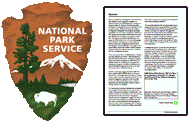United States National Park Service

United States National Park Service: Publications
Date of this Version
2003
Citation
Molecular Ecology (2003) 12 , 2261–2265; doi: 10.1046/j.1365-294X.2003.01863.x
Abstract
To evaluate the influence of diet on faecal DNA amplification, 11 captive brown bears (Ursus arctos) were placed on six restricted diets: grass (Trifolium spp., Haplopappus hirtus and Poa pratensis), alfalfa (Lupinus spp.), carrots (Daucus spp.), white-tailed deer (Odocoileus virginianus ), blueberries (Vaccinium spp.) and salmon (Salmo spp.). DNA was extracted from 50 faecal samples of each restricted diet, and amplification of brown bear DNA was attempted for a mitochondrial DNA (mtDNA) locus and nuclear DNA (nDNA) locus. For mtDNA, no significant differences were observed in amplification success rates across diets. For nDNA, amplification success rates for salmon diet extracts were significantly lower than all other diet extracts (P < 0.001). To evaluate the accuracy of faecal DNA sex identification when female carnivores consume male mammalian prey, female bears were fed male white-tailed deer. Four of 10 extracts amplified, and all extracts were incorrectly scored as male due to amplification of X and Y-chromosome fragments. The potential biases highlighted in this study have broad implications for researchers using faecal DNA for individual and sex identification, and should be evaluated in other species.

